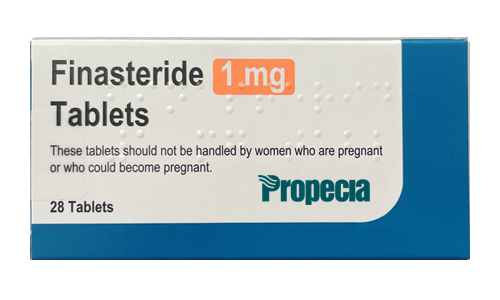Buy Propecia (Finasteride) online | Hair Loss treatment option

| Product Name: | Finasteride (Propecia) |
|---|---|
| Doses: | 1mg |
| Prices: | $ 0.50 – Per Pill |
| Where To Buy Online | OnlinePharmacy |
|
Propecia, known generically as finasteride, is a medication primarily used to treat male pattern hair loss. It is a type 2 5-alpha-reductase inhibitor, which works by reducing the amount of dihydrotestosterone (DHT) in the body, a hormone that causes hair loss in men. Developed by Merck & Co., Propecia was approved by the FDA for the treatment of male pattern baldness in 1997. It is one of the few clinically proven and FDA-approved treatments for this condition. Propecia is most effective in men with mild to moderate hair loss at the vertex and the anterior mid-scalp area. Its effectiveness in other areas of the scalp has not been conclusively proven. The medication is available only through prescription and is formulated for use by men only. It is not recommended for use by women or children. Finasteride, the active ingredient in Propecia, was originally developed to treat benign prostatic hyperplasia (BPH), a condition also influenced by DHT levels. What is Propecia used for? Propecia is primarily used for the treatment of male pattern hair loss (androgenetic alopecia) on the vertex and the anterior mid-scalp area. Its primary role is to prevent further hair loss and promote hair regrowth in affected areas. It has been shown to be effective in increasing hair count, improving hair quality, and slowing down the progression of hair loss. In addition to treating hair loss, Propecia's active ingredient, finasteride, is also used in a higher dosage form (Proscar) for the treatment of benign prostatic hyperplasia (BPH). Propecia is not indicated for use in women or children, and it has not shown significant effectiveness in treating hair loss in postmenopausal women. While Propecia can be an effective treatment for hair loss, its use is strictly for cases diagnosed as male pattern baldness and under medical supervision. What Dosages and Forms is Propecia available in? Propecia is available in a single dosage form - a 1 mg tablet of finasteride. This is the standard and only dosage approved for the treatment of male pattern baldness. The tablets are film-coated, preventing contact with the active ingredient during normal handling, provided they are not broken or crushed. For the treatment of benign prostatic hyperplasia, finasteride is available in a higher dosage of 5 mg under the brand name Proscar. Patients are advised to adhere to the prescribed dosage and not to modify it without consulting a healthcare provider. It is important to note that increasing the dosage does not necessarily improve efficacy in treating hair loss and can increase the risk of side effects. How to take Propecia? Propecia is taken orally, with or without food, usually once a day or as directed by your healthcare provider. Consistency in the time of day it is taken is advised for the best results. It's important to take Propecia regularly to get the most benefit. If a dose is missed, one should not double the next dose but continue as usual. Because Propecia can be absorbed through the skin, women and children should not handle broken or crushed tablets. Patients should be informed about the need for regular follow-ups to monitor the effectiveness and any potential side effects of the treatment. How long does it take for Propecia to work? Results from Propecia are not immediate. Most patients may need to use Propecia daily for three months or more before any benefits are observed. Initial signs of hair regrowth may be seen as early as three months, but it can take up to a year to see the full benefits of the treatment. If there is no improvement after 12 months of use, further treatment with Propecia is unlikely to be of benefit. Continuous use is necessary to maintain benefit, which might be reversed within 12 months after stopping treatment. Patients are advised to have realistic expectations and to consult with their healthcare provider about the progress and results of the treatment. How long does Propecia last? Once Propecia treatment is initiated, its effects continue as long as the medication is taken. The active ingredient, finasteride, maintains its function only with ongoing administration. Typically, if treatment is stopped, any hair that has been gained or maintained will likely be lost within 12 months of stopping the medication. It's important for patients to understand that Propecia is a long-term commitment and stopping the medication will likely reverse its benefits. Regular consultations with a healthcare provider are essential to assess the long-term effectiveness and need for continued therapy. Long-term studies have shown that continued use of Propecia is safe and effective for the majority of men over several years. Generic Propecia Availability Generic versions of Propecia, containing the same active ingredient finasteride, are available. These generics are typically less expensive and equally effective. The FDA has approved several generic versions, ensuring they meet the same standards of safety, effectiveness, and quality as the brand-name drug. Generic finasteride is available in the same 1 mg dosage for hair loss, providing a more cost-effective option for patients. Patients should consult their healthcare providers to determine if a generic version is appropriate for their treatment plan. It's important to obtain generic medications from reputable sources to ensure quality and efficacy. Propecia Possible Side Effects While Propecia is effective for hair loss treatment, it can have potential side effects. It's crucial for patients to be aware of these and discuss them with their healthcare provider. Common Side Effects: Some of the more common side effects of Propecia include:
Rare but Serious Side Effects: Rare, but more serious side effects may include:
Long-Term Side Effects: Some side effects of Propecia may continue even after stopping the medication, including:
Monitoring and Managing Side Effects: Regular monitoring and timely reporting of any side effects to a healthcare provider are essential. Adjustments to dosage or discontinuation might be necessary in some cases. Risk-Benefit Analysis: Patients should discuss the risks and benefits of Propecia with their healthcare provider, considering personal health history and the severity of hair loss. Propecia Patient Experiences and Reviews Patient experiences with Propecia offer a mixed perspective, highlighting both positive outcomes and concerns regarding side effects. Positive Experiences:
Varying Degrees of Effectiveness: Effectiveness varies, with some experiencing significant improvements while others see minimal change:
Individual Responses and Considerations: Propecia's impact varies greatly among individuals, influenced by factors like age, health status, and individual responses to the medication. Overall Satisfaction and Quality of Life: Despite some concerns, a considerable number of users express overall satisfaction with Propecia, citing improvements in hair density and self-confidence. Overall satisfaction and quality of life with Propecia Despite some concerns, a considerable number of users express overall satisfaction with Propecia, citing improvements in hair density and self-confidence. The impact of Propecia on the quality of life is a significant consideration for many patients. This aspect explores how the treatment influences overall well-being and life satisfaction. |

